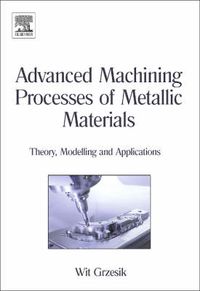
Advanced Machining Processes of Metallic Materials: Theory, Modelling and Applications Upplaga 1
This book updates our knowledge on the metal cutting processes in relation to theory and industrial practice. In particular, many topics reflect recent developments, e.g. modern tool materials, computational machining, computer simulation of various process phenomena, chip control, monitoring of the cutting state, progressive and hybrid machining operations, and generation and modelling of surface integrity. This book addresses the present state and future development of machining technologies. It provides a comprehensive description of metal cutting theory, experimental and modelling techniques along with basic machining processes and their effective use in a wide range of manufacturing applications. Topics covered include fundamental physical phenomena and methods for their evaluation, available technology of machining processes for specific classes of materials and surface integrity. The book also provides strategies for optimalization techniques and assessment of machinability. Moreover, it describes topics not currently covered in other sources, such as high performance and multitasking (complete) machining with a high potential for increasing productivity, and virtual and e-machining. The research covered here has contributed to a more generalized vision of machining technology, including not only traditional manufacturing tasks but also new potential (emerging) applications such as micro- and nanotechnology. - Many practical examples of modern machining technology- Applicable for various technical, engineering and scientific levels- Collects together 20 years of research in the field and related technical information
Upplaga: 1a upplagan
Utgiven: 2008
ISBN: 9780080445342
Förlag: Elsevier
Format: Inbunden
Språk: Engelska
Sidor: 446 st
This book updates our knowledge on the metal cutting processes in relation to theory and industrial practice. In particular, many topics reflect recent developments, e.g. modern tool materials, computational machining, computer simulation of various process phenomena, chip control, monitoring of the cutting state, progressive and hybrid machining operations, and generation and modelling of surface integrity. This book addresses the present state and future development of machining technologies. It provides a comprehensive description of metal cutting theory, experimental and modelling techniques along with basic machining processes and their effective use in a wide range of manufacturing applications. Topics covered include fundamental physical phenomena and methods for their evaluation, available technology of machining processes for specific classes of materials and surface integrity. The book also provides strategies for optimalization techniques and assessment of machinability. Moreover, it describes topics not currently covered in other sources, such as high performance and multitasking (complete) machining with a high potential for increasing productivity, and virtual and e-machining. The research covered here has contributed to a more generalized vision of machining technology, including not only traditional manufacturing tasks but also new potential (emerging) applications such as micro- and nanotechnology. - Many practical examples of modern machining technology- Applicable for various technical, engineering and scientific levels- Collects together 20 years of research in the field and related technical information
Begagnad bok (0 st)
Varje vecka tillkommer tusentals nya säljare. Bevaka boken så får du meddelande när den finns tillgänglig igen.



